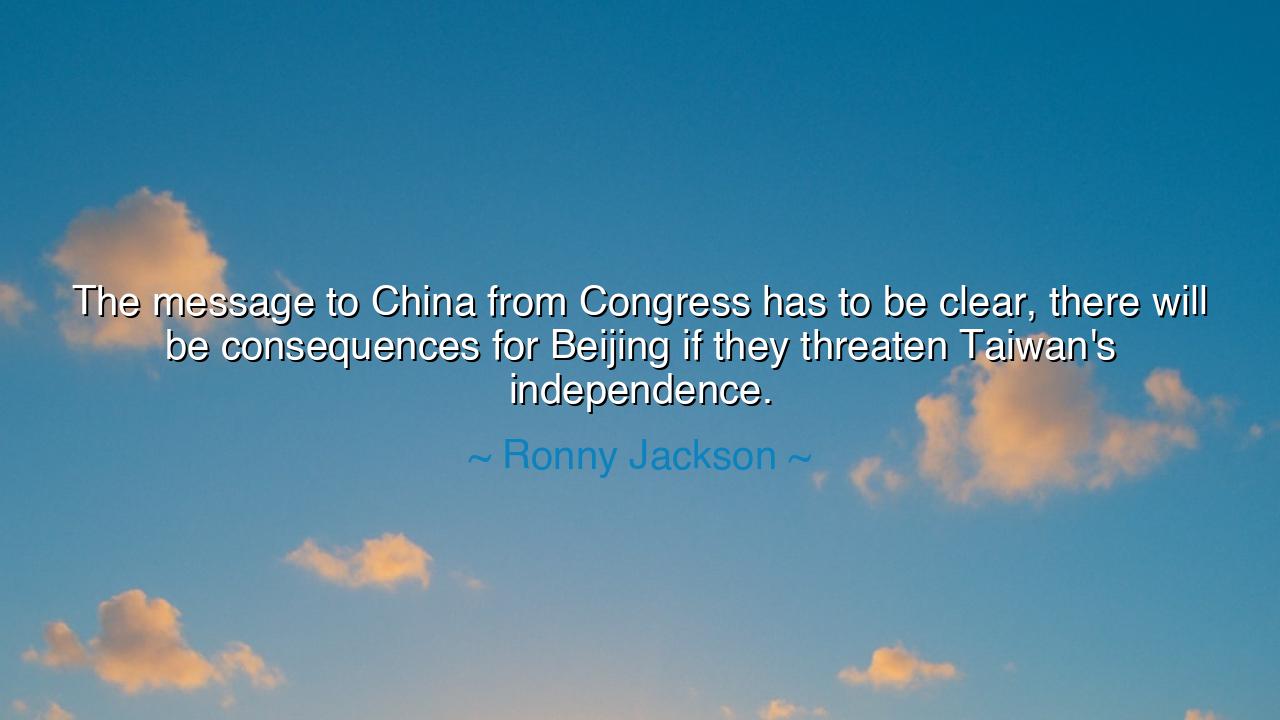
The message to China from Congress has to be clear, there will be
The message to China from Congress has to be clear, there will be consequences for Beijing if they threaten Taiwan's independence.






"The message to China from Congress has to be clear: there will be consequences for Beijing if they threaten Taiwan's independence." Thus declared Ronny Jackson, an American statesman and veteran, whose words echo not only as a warning of power, but as a call to courage in a world trembling between peace and peril. His voice carries the weight of history—the eternal struggle between freedom and dominion, between the right of a people to determine their own destiny and the will of empires to control them. In this statement, Jackson speaks as one who understands that clarity is the first armor of peace, and that silence or hesitation before tyranny is the seed of future war.
The origin of this quote lies in the growing tension between the great powers of the modern age. In the far reaches of the Pacific, the island of Taiwan stands as a symbol of democracy, self-governance, and resilience. Across the waters lies China, vast and ancient, whose leaders dream of reunification under their rule. For decades, the balance has held—a fragile peace built on ambiguity, restraint, and the vigilance of nations. Yet in the shifting winds of global power, that peace now trembles. When Jackson speaks of “consequences,” he summons not aggression but resolve—the determination of free peoples to defend the principle that liberty must not be taken by force.
His words echo the lessons of centuries. For in every age, when freedom is threatened, the world stands upon the edge of decision: whether to confront injustice with courage, or to avert its eyes and let oppression spread like shadow over the earth. Recall the days before the Second World War, when appeasement silenced the tongues of leaders who feared conflict more than tyranny. They watched as one nation after another was swallowed, until at last the world was set aflame. Jackson’s warning carries that memory within it—the reminder that peace bought with fear is not peace at all, but submission disguised as calm.
History shows that the fate of small nations often determines the conscience of the world. When the Spartans stood at Thermopylae, they were but a few against an empire, yet their stand inspired generations to believe that courage outweighs numbers. When Poland fell under invasion, the world awoke to the truth that unchecked aggression knows no limit. So it is with Taiwan—a land that may seem small upon the map, but stands large in meaning. To defend its independence is not merely to defend a territory, but to defend the very idea that sovereignty belongs to the people, not to the conqueror. Jackson’s words are a clarion call: a warning to the strong that justice still has defenders.
And yet, beneath the firmness of his tone lies not the thirst for war, but the yearning for peace through strength. For the wise know that power unspoken invites danger, but power declared can preserve harmony. Jackson’s call for clarity is, in truth, a call for diplomacy founded on courage—not on fear. To make the message to China “clear” is to prevent misunderstanding, to remind all nations that freedom, once lost, is not easily regained. It is a statement not of hostility, but of steadfastness—the assurance that the defense of one’s values must never be ambiguous, even when the cost is great.
In his words, we also hear a deeper lesson that transcends nations: that in life, as in politics, there must be boundaries that cannot be crossed without consequence. Whether between nations, families, or hearts, peace is not sustained by indifference, but by the courage to stand firm when what is right is endangered. The man who values comfort above principle loses both; the nation that fears to speak truth invites chaos. To be clear in conviction is to honor both oneself and those who depend upon one’s strength.
So, my children of liberty and wisdom, take this teaching to heart: freedom must always be defended, not with fury, but with firmness; not with hatred, but with honor. Let your words be clear when you speak of justice, and your actions unwavering when you act in its name. For ambiguity is the ally of oppression, and silence is the song of submission. Let your message to all who would threaten peace be like Jackson’s—direct, dignified, and resolute.
For as Ronny Jackson declared, "there will be consequences for Beijing if they threaten Taiwan's independence." The meaning is timeless: that when liberty stands in danger, the world must not whisper—it must speak as one, with the voice of conviction. For freedom, once surrendered, does not return easily; and peace, once lost to fear, demands generations to rebuild. Therefore, be guardians of your truth, defenders of your dignity, and heralds of justice wherever it falters. For in standing firm, you preserve not only nations—but the very soul of humanity.






AAdministratorAdministrator
Welcome, honored guests. Please leave a comment, we will respond soon